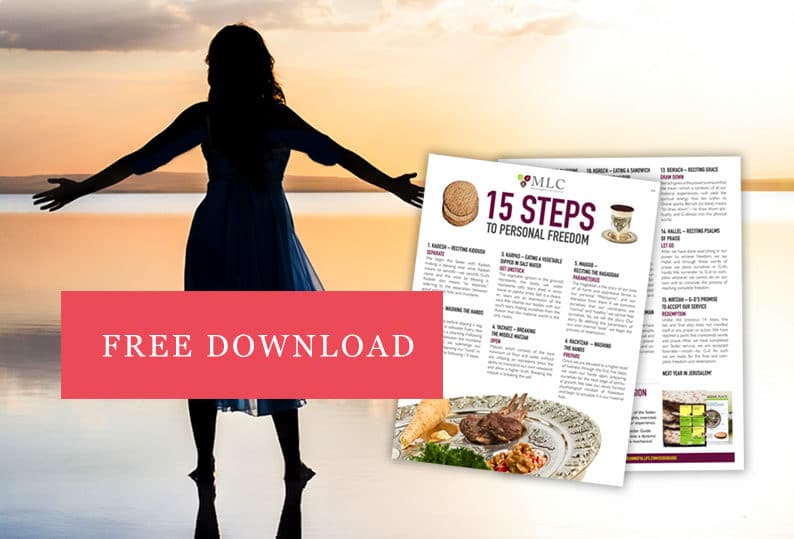There is a well known myth that Inuit have one hundred names for the word snow (in fact they have as many names for snow as we do in English). This urban legend is based on the belief that the language of different peoples reflects their unique experiences and cultures. Since Inuit live in a predominantly snowy climate they developed many different words that express different aspects and variations of snow.
What is not a myth however is that the Torah has many names for G-d – seven, ten, even seventy. When we don’t have much interaction with a particular experience, we will not be sensitive or even care about its nuances. Thus, a casual or superficial take on G-d will not yield many names. But people we love and care for will elicit in us many names (and nicknames) as we relate to them in different modes and situations. An intimate relationship with G-d dictates many dimensions of the experience, hence the many names the Torah employs in describing the different manifestations of the Divine experience.
(Indeed, the Zohar explains that the Divine Essence has no name, and cannot be alluded to in any which way. But Divine revelation manifests in multitude of forms.)
The same is true with the word freedom. Cursorily, without giving it much thought, freedom means to be free. But if we want to experience freedom in its true form, if we want to be free in the fullest sense of the word, we will realize that freedom has different names, expressing different manifestations of the experience.
Freedom. The word captures the essential progress of the modern Western world – the free world. But what does freedom actually mean? And are we actually free? Even when we have no enemies without, aren’t we enslaved to our needs and desires, our own fears and inhibitions – our internal, psychological enemies? And what about all the forces and demands imposed upon us by work, material responsibilities, obnoxious bosses and all those that we are dependent upon, the constant inundation of marketers intruding into out psyches – forces of oppression that can debilitate us no less than a opponent wielding a weapon?
Is it possible to achieve true freedom?
To truly experience freedom we must associate with it not in superficial terms. When we move closer to internalize and experience freedom in an intimate way, we come to recognize that freedom actually has more than one name, more than one manifestation.
This week’s Torah portion – the Torah makes the Divine intimate – tells us that there are actually four different expressions for the word freedom.
When G-d tells Moses that He will redeem the Jewish people from their Egyptian bondage, G-d uses four different terms for the word redemption (which correspond to the four cups of wine we drink at the Passover Seder):
“I will take you out from the suffering of Egypt; I will deliver you from their bondage; I will redeem you with an outstretched arm and with great judgments. I will take you to Myself as a nation, and I will be to you a G-d…” (Exodus 6:6-7).
Practically speaking, these four expressions of freedom reflect four stages of Exodus:
1. First, the end of the long 210 year oppressive bondage – “I will take you out from the suffering of Egypt.”
2. The end of all hard labor, which stopped six months before the Jews actually left Egypt – “I will deliver you from their bondage.”
3. The actual exodus, physically leaving Egypt and the elimination of the Egyptian enemy – “I will redeem you with an outstretched arm and with great judgments.”
4. The Jewish people become a free nation, driven by a higher mission, servant only to G-d – “I will take you to Myself as a nation, and I will be to you a G-d.”
All events in the Torah, especially the central one of the Egyptian exodus, offer us a psycho-spiritual blueprint to guide us in the challenges of our own lives.
The redemption from Egypt represents transcendence. Mitzrayim (the Hebrew word for Egypt) means boundaries and constraints, referring to every limitation and inhibition that confines us – physical, emotional or spiritual. The redemption from Mitzrayim gives us each the power to achieve personal and collective freedom from all our constraints, whether it is an unhealthy relationship, a state of emotional despair, or anything that is blocking us from achieving our goals.
But to do so requires a close-up look at the different phases of redemption, so that we can acclimate ourselves to the process and align our efforts accordingly.
Four steps are necessary to be free from any given “trap” in our lives, all with the help from above:
1. “I will take you out from the suffering of Egypt.” First you must get out of the immediate line of fire. As long as you remain in an abusive situation, in range of a force that is hurting you, you cannot begin the journey toward freedom.
This first step away from the immediate cause of your suffering is only a first step, but it is critical: If you don’t “stop the bleeding,” healing cannot begin.
This step is often the hardest of them all, because after protracted years of pain you can become resigned and even accustomed to the oppression, to the point that it becomes so much part of your life and your being that it is hard to recognize the “enemy,” or even acknowledge that there is an “enemy” (what we call today: denial, but what was called back then: de (River) Nile), and distinguish friend from foe.
2. “I will deliver you from their bondage.” After you are taken out of the actual destructive situation, you must be delivered from the hold of the oppressive force. Even after their hard labor ended the Jewish people still remained in Egypt, under the effect of extensive exposure to their depraved culture and centuries of genocide. Thus the need to be delivered and break free from the psychological hold of being a “slave” for so long.
3. “I will redeem you with an outstretched arm and with great judgments.” Finally you get out of “prison,” but the enemy (or a similar one) is still lurking. At this stage you need an “outstretched arm” to embrace you and hold you tight and secure, reassuring you that you will be safe. And “great judgments” that eliminate the enemy, and ensure it does not return. Even after the Exodus, though Egypt remained a superpower and indeed, they pursued the Jews. Until they were utterly defeated at the Red Sea.
4. “I will take you to Myself as a nation, and I will be to you a G-d.” The first three phases were all about freeing yourself from the enemy. But you still are not free until you discover who you are. Freedom is not merely the absence of slavery – getting away from the past and escaping the negative. True freedom is a state of being on its own – the ability to be true to yourself, your true self, and live up to your inner calling and spiritual destiny.
Even after the enemy is vanquished you want a life that is not defined by the negative, even by being opposed to the enemy (like anti-anti-Semitism). You want to build your life in a way that stands for something great (not against something), and a life that will never again allow you to be enslaved, exploited, or constricted in the first place.
All life’s problems begin by allowing ourselves to be subjected and enslaved to man-made conventions. When you worship money, power, connections and social status – you have brought upon yourself an imposing “master” that will subjugate your freedom and ultimately annihilate your inner dignity.
Ultimate freedom is to not be bound to human devices; to discover your Divine calling and serve it with all you faculties and resources.
Only then can you call yourself a free man or woman.
* * *
As usual in Torah thought, after hearing about four stages, there is always a footnote to add:
Some commentators explain that at the Seder Table we pour a fifth cup for Elijah the Prophet, corresponding to the fifth expression in this week’s Portion: “I shall bring you to the land.”
After we finish our hard work in allowing ourselves to be freed from our own personal “mitzrayim” – constraints, corresponding to the four levels of the soul (biological nefesh, emotional ruach, cerebral neshomo and transcendental chaya), the fifth dimension (unified yechida) emerges – the Essential level of the Divine “brings you to the land,” with the coming of the Messiah in the final redemption, announced by Elijah the Prophet.
This fifth level is not accessible directly through our efforts. It only surfaces after we travel through the first four phases.
* * *









Freedom is knowing that you are free, even if external circumstances indicate enslavement. Whether through physical or existential oppression, or the small enslavements of modern life–debt, cell phones, email and the like–if you know in your soul that nothing and no one can take away your freedom to pray, to relate to Gd, to do the right thing at any given moment, then this is freedom.
Recently, my wallet was stolen. I didnt lose more than $20, but I lost my passport, drivers license and all my credit cards. Hence, I had to depend upon my husband (Eddie Selig) to vouch for my identity (sign a notarized document that I was his wife), and also for money.
That wasnt the worst of it. The worst of it was that my wallet was stolen not only in Jerusalem, which was bad enough, but at the Museum of the Psalms, which is located in the courtyard of the home of Rav Kook, zl. The material loss was bad enough, but I was more troubled by the loss of my official identity in my holy city, in the confines of the courtyard of a holy person, while I was buying a book of psalms from a painter who had the blessing of Rabbi Schneerson, zl. My children were afraid for me … what if no one knows who you are? How can you come home (to the U.S.)
I found myself calmly tell them that it didnt matter. I know who I am. I dont need a passport or a picture drivers license to remind me. I am rich; I dont need money or credit cards to prove it. My wealth came to me in the spiritual exploration I had to do to interpret my loss in its context.
This, I realize in retrospect, is freedom. Comfort in who you are and what you believe, even with faced with bewildering and troubling evidence to the contrary.
Freedom is BEING WHO WE TRULY ARE… It is taking responsibility for our lives and our actions, for our happiness and our unhappiness; knowing that at all times we have the freedom to choose LOVE instead of fear, anger and hate; PEACE instead of conflict and war; and JOY instead of misery – no matter what! No matter whats happening in our world, in our surroundings, around us, within us; or what others may think or do. We know who we are and can remain STRONG.
We have the choice to be free and choose all the good things that we deserve to find inner peace and to continue being WHO WE ARE…
Resolve that I will talk to someone about it and never do, and try to work it out in my own head… which usually doesnt work… so I basically end up doing nothing…
For me, freedom means the luxury of being free of fear, fear of poverty, reduced circumstances, abuse, etc. resulting in inner peace and consequently the ability to accept “is”.
Experiences have colored my sense of what it means to be free. My textbook knowing of what freedom is, differs from my knowledge that circumstances put constraints on my ability to be free. I believe that freedom needs a prerequisite, it needs PEACE. Without peace, freedom becomes locked in the experience of the moment and is not the freedom I seek — which is to soar into who I am and can be continuously. I bless us all that this new month of Adar will bring us all to that wonderous space where laughter/joy and Peace are joined in oneness.
I was born and raised in former USSR. As a Jewish girl I was asked many times the same question over and over again : Who gave you a right to speak?. At that time everything that we were saying had to be politically correct. So, many times I suppressed my voice just to asure the safety of my family. That is not a freedom. So, yes, without an ability to speak freely how free are we? And even now, after living in US for 20 years I still wonder am I free? And this is why.
One thing that was very positive in Russia is all Jews were looked at and approached as a one group. I had almost no knowledge about Juadaism but I knew who I was. I was simply a Jew and part of that Nation/people. I felt belong. After crossing borders, not only I was cast as a Russian but every time I had said I am Jewish it followed with another question What kind Jew are you? . I was offered many different memberships and yet, I just wanted to remain free and be just a simple Jew , the daughter of G-d, the woman of faith and the part of Jewish people with a right to speak and have my voice as a woman. And that is my definition of Freedom.
Freedom is being who you truly are at a soul level… not who you think you are, as you explained. Freedom and peace are the two sides of the same coin, you can not have one without the other. That is my view. Great article! Thank you. Love and peace.
Freedom is being who we truly are at a soul level… not who we think we are, as you explained. Freedom and peace go hand and hand, they are like the two sides of a coin… we can not have one without the another, that is my view. Great article! Thank you. Love and peace.
Wonderful article! Thank you. Freedom is being who we truly are, at a soul level… not who we ‘think’ we are. Freedom and peace go hand and hand, they are like two sides of a coin, we cannot have one without the other, when we ‘find’ one we ‘find ‘ the other, that is my view. Love and peace.